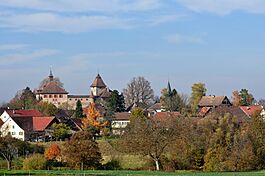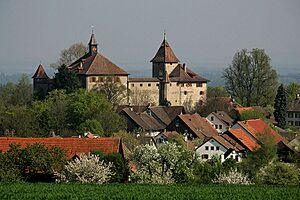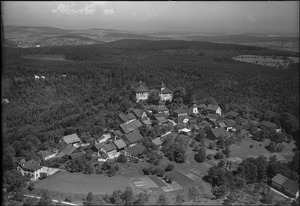Kyburg, Zürich facts for kids
Quick facts for kids
Kyburg
|
||
|---|---|---|
 |
||
|
||
| Country | Switzerland | |
| Canton | Zürich | |
| District | Pfäffikon | |
| Area | ||
| • Total | 7.58 km2 (2.93 sq mi) | |
| Elevation | 640 m (2,100 ft) | |
| Population
(December 2020)
|
||
| • Total | 411 | |
| • Density | 54.22/km2 (140.43/sq mi) | |
| Postal code |
8314
|
|
| Surrounded by | Illnau-Effretikon, Weisslingen, Winterthur, Zell | |
Kyburg is a small place in Switzerland. It used to be its own town, called a municipality, in the Pfäffikon area of the Zürich canton. Since 2016, Kyburg has been part of a larger town called Illnau-Effretikon.
History of Kyburg
The famous Kyburg castle was first mentioned way back in 1027. It was called Chuigeburch then. A small village started growing near the castle in the 1260s.
In 1337, the people of Kyburg got special rights from Albert II, Duke of Austria. This meant they could make their own rules and didn't have to pay certain taxes.
After a big fire in 1362, the town was rebuilt. It even got walls to protect it. In 1370, Leopold III, Duke of Austria gave Kyburg the right to hold a weekly market and a yearly fair.
Kyburg faced some tough times. It was taken over by people from Schwyz in 1407 during the Appenzell Wars. Later, it was partly destroyed in the Old Zürich War. Even so, it was rebuilt and kept its market rights.
In 1798, Kyburg lost all its special rights. It became a regular part of the Fehraltdorf district. Over the years, it moved between different districts. Finally, on January 1, 2016, Kyburg joined with the town of Illnau-Effretikon.
Where is Kyburg?
Kyburg covers an area of about 7.6 square kilometers (about 2.9 square miles). A big part of this land, about 61%, is covered by forests. About 31.9% of the land is used for farming.
A smaller part, 5.4%, has buildings and roads. The rest of the land, about 1.7%, is made up of rivers or mountains.
The village of Kyburg is built on a type of rock formation called Molasse stone. It sits in the Töss Valley. The village is famous for the Kyburg castle, which is why the village has its name.
Kyburg also includes smaller areas called hamlets. These include Ettenhausen, parts of Billikon, and Brünggen. There's also a factory settlement called Mühlau an der Töss.
People of Kyburg
Kyburg has a population of 411 people. About 7.4% of the people living in Kyburg are from other countries.
Most people in Kyburg speak German, about 98.5%. A small number of people also speak Serbo-Croatian or Italian.
In 2007, the most popular political party in elections was the SVP. Other popular parties included the SPS, the Green Party, and the FDP.
When it comes to age, about 26.3% of the people are children and teenagers (0–19 years old). Adults (20–64 years old) make up 64.4% of the population. Older people (over 64 years old) make up 9.3%.
Most adults in Kyburg have finished high school or gone on to higher education. This means about 88.7% of people aged 25-64 have a good education.
Kyburg has a low unemployment rate of 1.23%. This means most people who want to work have jobs. Many people work in farming, manufacturing, or service jobs.
In terms of religion, most people in Kyburg are Protestant, especially from the Swiss Reformed Church. A smaller number of people are Catholic.
Here is how the population of Kyburg has changed over time:
| year | population |
|---|---|
| 1634 | 148 |
| 1771 | 296 |
| 1850 | 374 |
| 1900 | 358 |
| 1950 | 386 |
| 2000 | 396 |
Getting Around Kyburg
The Sennhof-Kyburg railway station is a train stop in Kyburg. It is part of the Zürich S-Bahn train service, specifically the S26 line. This makes it easy for people to travel to and from Kyburg by train.
See also
 In Spanish: Kyburg para niños
In Spanish: Kyburg para niños






